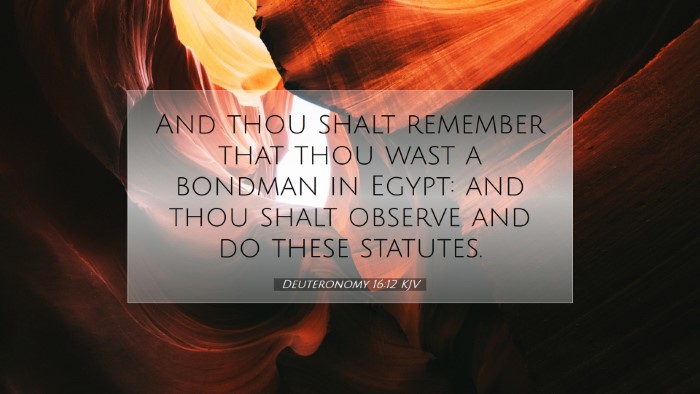Commentary on Deuteronomy 16:12
Verse: "And thou shalt remember that thou wast a bondman in Egypt: and thou shalt observe and do these statutes."
Introduction
The book of Deuteronomy serves as a reiteration of God's laws and commandments to the Israelites as they prepare to enter the Promised Land. In this context, Deuteronomy 16:12 provides a poignant reminder of the liberation from slavery in Egypt and the importance of observing God's statutes. The verse emphasizes the need for Israel to remember their past and live in accordance with the covenant established with God.
Summary of Insights
Commentaries from Matthew Henry, Albert Barnes, and Adam Clarke illuminate various aspects of Deuteronomy 16:12. The following themes are particularly noteworthy:
- The Call to Remember: This verse emphasizes the importance of memory in the life of faith. God's deliverance from Egypt is a foundational aspect of Israel's identity, serving as both a reminder of past oppression and a celebration of divine redemption.
- The Role of Personal Experience: Each Israelite is called to remember their own experience as slaves in Egypt. This personal acknowledgment of bondage fosters empathy and generous behavior towards others, particularly those who are marginalized.
- The Importance of Obedience: The command to observe and do these statutes is rooted in the memory of God's grace. Hence, obedience becomes not just a duty, but a response of gratitude for the liberation experienced.
- Teaching Future Generations: The remembrance of one’s past serves a pedagogical function, ensuring that succeeding generations understand the significance of God's intervention and the obligation to uphold His laws.
Detailed Commentary
1. The Significance of Remembrance
Matthew Henry emphasizes that remembering one's past—especially a time of suffering—instills a sense of humility and gratitude. When Israelites remember their slavery in Egypt, they are reminded of their dependency on God for deliverance. This memory cultivates a heart of thankfulness and inhibits pride, as the Israelites are to recognize that their present state is by God’s grace alone.
2. The Nature of Deliverance
Albert Barnes remarks that acknowledging their status as former bondmen allows the Israelites to appreciate the freedom they now enjoy. God's mighty hand in their exodus from Egypt is not merely a historical event but a central tenet of their covenant relationship with Him. The liberation signifies not only physical freedom but also a transition into a new identity as God's chosen people.
3. Observance of Statutes
Adam Clarke points out that the observance of statutes is linked to the recognition of God’s past workings. The commandments given here are not arbitrary; they stem from the experience of liberation. The laws serve as guidelines for living in a manner that honors God, who has redeemed them. Thus, the stator's observance becomes an act of worship, a declaration of trust in the Lord.
4. Social Justice and Compassion
The mention of being a bondman in Egypt also has implications for social justice. As the Israelites reflect on their past, they are encouraged to extend kindness and compassion towards the less fortunate among them. Barnes comments on the necessity of treating others with dignity, taking into consideration their own history of oppression. This theme aligns with the broader biblical call to care for the orphan, widow, and stranger.
5. Pedagogical Responsibility
Finally, the command to remember serves a crucial educational purpose. Future generations must be taught the significance of their history and the laws of God. Clarke notes that this communal memory fosters a deep connection with God’s faithfulness. It builds a legacy of obedience that is passed down, ensuring that the younger generation understands the weight and importance of their covenant relationship with God.
Conclusion
Deuteronomy 16:12 encapsulates foundational principles for Israel and for modern believers. The act of remembering is not passive but requires active engagement with the past to inform present obedience. The call to remembrance invokes gratitude, cultivates compassion for others, and ensures the continuity of faith among generations. In nurturing these practices, both individuals and communities can live out their faith in a manner that honors God and reflects His graciousness in their lives.


